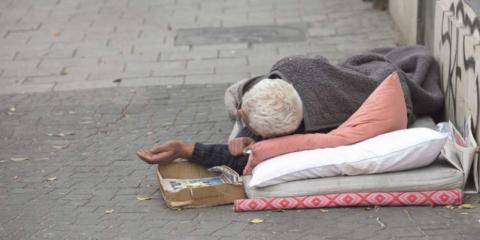Homeless in israel
The benefit paid to someone finding himself without a home and meeting the stringent conditions of the Labor, Social Affairs and Social Services Ministry is only 1,632 shekels ($436) a month. It turns out that 62 percent of the homeless don’t receive even this much, and only 48 percent get some assistance with their rent, in an amount that doesn’t suffice for renting even one room. The reason is that the homeless are required to produce documents that they have no access to and to make payments they can’t afford.
These figures emerge from research conducted by Dr. Shmuel Sheintoch of Sapir College, who looked at Central Bureau of Statistics data. The study related to the years between 2000 and 2017, comparing Israel with other countries. Professionals in government offices and people helping the homeless were interviewed for the study, with the results being made public here for the first time.
“Up to 150 years ago, most people were poor and being affluent was the exception. Since then, things have reversed in developed countries. Thus, the poor don’t interest most people. Welfare states have a social security network in order to look after those who need it. Do these people also interest decision- and policy-makers less? What about people in extreme poverty?” asks Dr. Sheintoch in his study. His recommendations are, for example, to help the homeless with rent, which seems self-evident. The study points to the long path the system must still travel to truly help those in need. The study was funded by the National Insurance Institute, and will be presented next week at a conference at Sapir College.
According to official government figures, Israel is doing extremely well in terms of the proportion of homeless people, with only 0.02 percent of the population in this category in 2016. In other Western countries it’s much higher, ranging from 0.13 percent to 0.38 percent. However, estimates are that the actual numbers in Israel are six to 17 times higher than the official ones.
The Ministry of Social Affairs has been saying the numbers are larger, but there are no reliable figures, says Dr. Sheintoch. The criteria for defining someone as homeless are particularly harsh in Israel and the ministry has promised to change these, but hasn’t done so yet.
Anyone meeting these criteria is entitled to benefits, but the maximal amount currently stands at 1,735 shekels ($464) a month for a single person, from which 103 shekels come off for health insurance. Everyone agrees you can’t live on this amount. But even for those meeting the criteria, 62 percent do not get the payment they qualify for. Of those who did get the benefit, 42.4 percent only received it for one to three months. Three hundred fifty people got it for one year, the maximal period allowed. In exceptional cases, 20 months is the limit. Official statistics show that 26 percent of the homeless are on the streets for more than four years. In practice, the homeless are left without any assistance.
The study recommends paying these benefits for an unlimited duration, as long as a person is defined as homeless.
The homeless are also entitled to rent assistance, amounting to 1,170 shekels a month in the first year, dropping in subsequent years. This is too small an amount and is given only up to four years. It hasn’t been updated since 2010. Only 48 percent of the homeless made use of this benefit, due to various barriers. These include obtaining documents supporting one’s claim of homelessness, such as loss of a previously-owned apartment, or tax statements. This is difficult for people with no means who are living on the street.
There have been calls to increase these amounts by people working with the homeless and by several government ministries, the National Insurance Institute and the state comptroller, as well as by several state commissions. The treasury has objected to such a raise, arguing that it would place a heavy burden on the state’s budget.
Lee Yaron

